Landlord Tells Of His Tenant's GF For Suggesting His Senior Cat Should Be Put Down For Harming Her Son
Every pet owner loves their four-legged friend with all their heart and would never allow anything bad to happen to their baby. They are part of the family, and disrespecting them means disrespecting the family as a whole.
Even though some people adopt pets for protection, most would protect their animals with their lives if they had to. You make sure that nothing bad ever happens to your best friend, and they do the same for you.
Unfortunately, some people allow themselves to disrespect and disturb animals for no reason. When the animal retaliates and fights back, they pin everything on them and claim that they have aggression issues of some sort.
A Redditor who goes by the username u/AITAMrMeow made a post on the r/AmItheA**hole subreddit where he explained how he banned a woman from his house for suggesting that his senior cat should be put down. The tenant's lease was about to end, and the user refused to renew it because of the comment.
The user received a lot of interesting reactions to his post. Scroll down to check out the full Reddit post, and scroll a little further to read the comments from the original post.
Here's the original post by Reddit user u/AITAMrMeow:
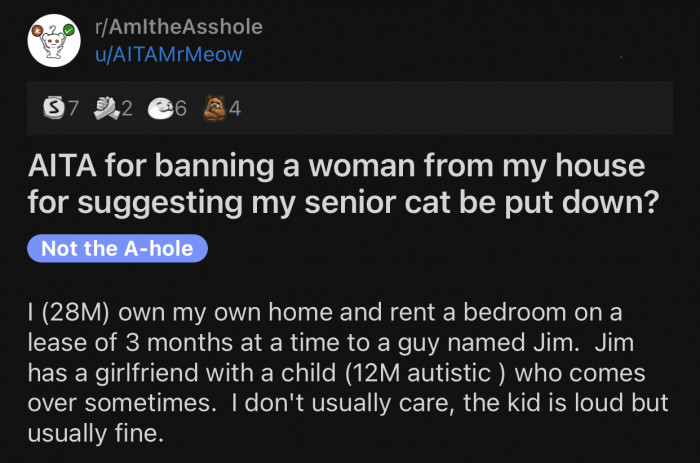
OP has a senior cat, Loki, who never bothers anyone.

OP modified the post to include additional info about the situation.

Understanding the Emotional Bond with Pets
Dr. Angela Ross, a psychologist at UCLA, emphasizes that the emotional bond between humans and pets can lead to profound feelings of attachment and loyalty.
Research shows that pets often become integral members of the family, leading to strong emotional responses when conflicts arise regarding their care.
This emotional investment can complicate situations when threats to a pet's well-being are perceived.
Understanding Emotional Reactions to Pets
The intense emotional response of the mother in this situation reflects common reactions when pets are perceived as threats to children. Research in child development psychology indicates that parents often experience heightened anxiety when their children are involved, leading to protective behaviors. This instinct to protect children can sometimes overshadow rational discussions about pet behavior.
Recognizing these emotional dynamics is essential in navigating conflicts involving pets and children.
OP eventually added a second edit to update us about the situation.

Here's how the Reddit community reacted to u/AITAMrMeow's post:

According to her logic, she should also be taken to the vet.

Studies indicate that the loss or perceived threat to a pet can evoke strong feelings of anxiety and protectiveness in owners.
Understanding the depth of these emotional bonds can help clarify why conflicts may escalate quickly in situations involving pets.
Recognizing the psychological factors at play is essential for managing these dynamics effectively.
This incident also highlights the importance of understanding animal behavior in relation to child interactions. Studies suggest that education about pet behavior can help parents feel more secure and reduce anxiety when pets and children interact. Understanding the nature of a pet's actions can provide valuable context for parents and help them respond more effectively to potential threats.
The boyfriend has known it for a month but never told her.

OP should be expecting the worst.
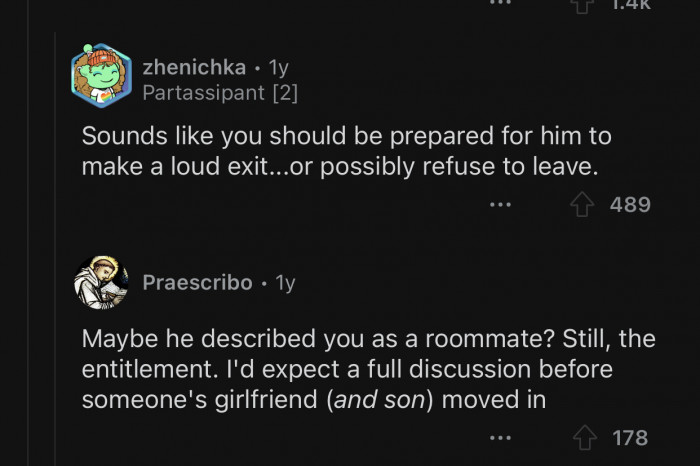
Animals only attack after feeling threatened.
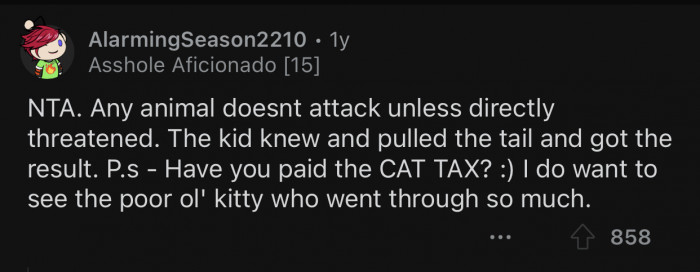
Navigating Conflict with Neighbors
This situation highlights the complexities of neighborhood relationships and the conflicts that can arise from differing perceptions of pet behavior.
Research suggests that misunderstandings between neighbors often stem from a lack of communication and empathy.
Addressing these conflicts requires careful navigation to ensure that all parties feel heard and respected.
Addressing Concerns Through Communication
To resolve conflicts regarding pets and children, open communication is crucial. Engaging in dialogues about expectations and concerns can help alleviate misunderstandings. Research supports the idea that families that prioritize communication are better equipped to handle conflicts and find constructive solutions.
Utilizing a calm and empathetic approach can foster understanding and respect between the pet owner and the concerned parent.
It's an "attention-seeking" bite to request more attention.

OP should keep a close eye on his cat to prevent this.

She was completely clueless and overstepped her boundaries.

To mitigate conflicts, establishing open lines of communication with neighbors is crucial.
Engaging in proactive discussions about pet behavior and expectations can foster understanding and reduce tensions.
Creating a community culture that values empathy and respect can lead to healthier relationships among neighbors.
Involving a neutral third party, such as a veterinarian or animal behaviorist, can also provide valuable insights and facilitate discussions. Professional guidance can help address concerns while educating all parties involved about appropriate pet-child interactions. This collaborative approach can lead to more informed decisions and foster a sense of community among neighbors.
You can't blame the cat for defending himself.
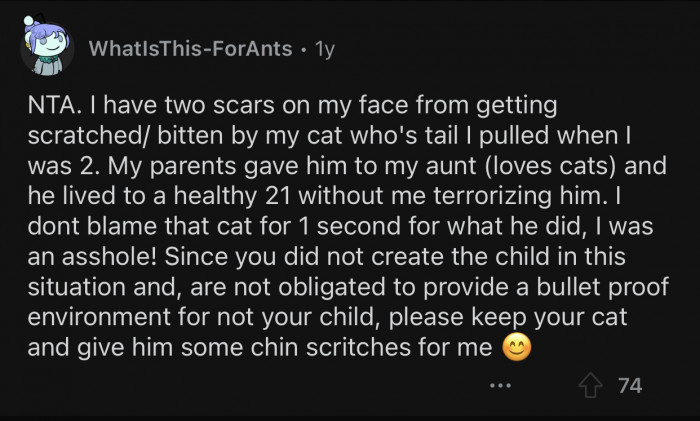
"We would talk about how if we were in that position, we would consider putting the dog down since he was in so much pain."

The boyfriend knows that the decision was made long ago.

The Role of Empathy in Conflict Resolution
Empathy plays a crucial role in understanding and resolving conflicts related to pet ownership.
Research indicates that individuals who practice empathy are more likely to navigate disputes effectively and maintain positive relationships.
Encouraging empathetic dialogues can facilitate understanding and cooperation among neighbors.
The boyfriend can "backdate" the incident to plead his case.
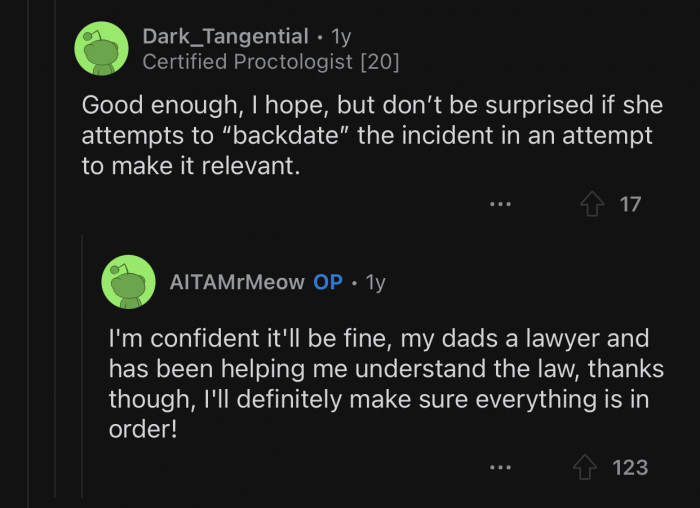
OP's cat deserves peace and safety.
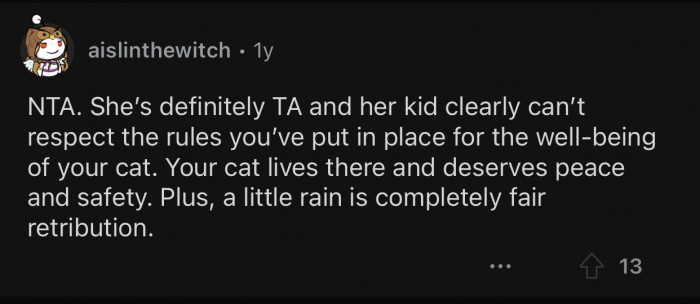
The girlfriend had no business telling OP that.

Practicing active listening and validating each other's feelings can help prevent misunderstandings and foster a sense of community.
Engaging in collaborative problem-solving can also create opportunities for shared solutions that benefit all parties involved.
Ultimately, fostering an empathetic environment can lead to more harmonious neighborhood dynamics.
OP only wanted an outside opinion.

It's OP's property after all, and he has the right to choose who gets to live there.
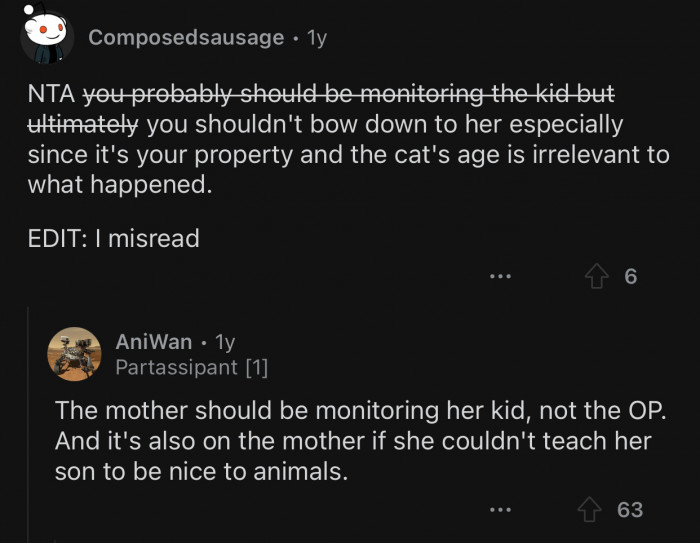
Loki normally sleeps on the bookcase.

The Psychological Impact of Threats to Pets
Threats to a pet's safety can evoke strong emotional responses, including fear and defensiveness.
Research shows that when individuals perceive their pets are in danger, it can trigger a fight-or-flight response similar to that experienced in human conflicts.
Understanding these emotional triggers is essential for managing reactions and facilitating healthier discussions.
The girlfriend was acting way too entitled, and OP put her back in her place. She dared to say that OP's cat should be put down when her son was the one who provoked him out of nowhere.
The cat's reaction was perfectly natural, and the girlfriend should have apologized for her son's behavior. If you enjoyed reading this, please make sure to check out similar content on our platform.
Psychological Analysis
This situation highlights the protective instincts parents have regarding their children, often leading to heightened emotional responses. Understanding these dynamics can facilitate healthier discussions around pet behavior and safety.
Analysis generated by AI
Analysis & Alternative Approaches
The emotional complexities surrounding pets and children necessitate open dialogue and understanding to navigate conflicts effectively. Research supports the idea that education about animal behavior and effective communication can mitigate misunderstandings and foster healthier interactions. By prioritizing these strategies, families can create safer environments for both children and pets.
Encouraging calm discussions during conflicts can help individuals manage their emotional responses more effectively.
Practicing de-escalation techniques, such as deep breathing and reflective listening, can create a more conducive environment for resolution.
By prioritizing emotional awareness, individuals can navigate conflicts with greater ease.
Building a Supportive Community
Establishing a supportive community environment is vital in managing conflicts related to pet ownership.
Research indicates that neighborhoods with strong social ties tend to experience fewer disputes and greater cooperation.
Fostering relationships with neighbors can create a more understanding and compassionate community.
Encouraging community engagement through neighborhood meetings or pet owner associations can enhance communication and understanding.
Creating opportunities for neighbors to discuss their concerns and share experiences can build a sense of camaraderie and reduce tensions.
Ultimately, fostering a supportive community atmosphere can lead to healthier relationships and a better quality of life for all residents.
Analysis & Alternative Approaches
In conclusion, understanding the emotional dynamics surrounding pet ownership is essential for navigating conflicts effectively.
By fostering open communication, empathy, and community engagement, individuals can enhance their relationships with neighbors and create a more harmonious living environment.
Recognizing the psychological impacts of these dynamics can lead to healthier interactions and a greater sense of community.



